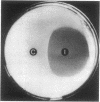Abstract
Rhodococcus equi is a gram-positive coccobacillus which, like other members of the order Actinomycetales, is increasingly reported as an opportunistic pathogen in patients with AIDS. The use of combinations of antibiotics that include imipenem (IMP) has been suggested for the treatment of patients infected with R. equi. An antagonism between IMP, meropenem, cefoxitin, ceftriaxone, moxalactam, and oxacillin and other beta-lactams, such as penicillin, amoxicillin, cephalothin, and ticarcillin, was detected in vitro both on Mueller-Hinton agar and in broth for all 10 IMP-susceptible R. equi strains examined. To study the mechanism of the antagonism between beta-lactams, a mutant with decreased susceptibility to IMP (isolate IpR) was selected in vitro from a susceptible clinical isolate of R. equi (isolate IpS). IpR exhibited decreased susceptibility to IMP, meropenem, cefoxitin, ceftriaxone, moxalactam, and oxacillin but not to penicillin, amoxicillin, cephalothin, or ticarcillin. No beta-lactamase was found in IpS, IpS cultured with antagonistic beta-lactams, or IpR strains. Labeling of penicillin-binding proteins (PBPs) revealed four PBPs with molecular masses of ca. 59, 56, 43, and 26 kDa in IpS. In IpR, PBP 3 disappeared and was replaced by PBP 3a of 40 kDa. The 50% saturation of PBP 3 and PBP 3a by the carbapenems correlated with the MICs of these antibiotics, respectively, for IpS and IpR strains. However, PBP 3a was not detected in IpS when IpS was cultured in the presence of beta-lactams, with which antagonism was observed. The present work describes the PBPs of R. equi and reports that IMP resistance in R. equi is related to an altered PBP pattern.
Full text
PDF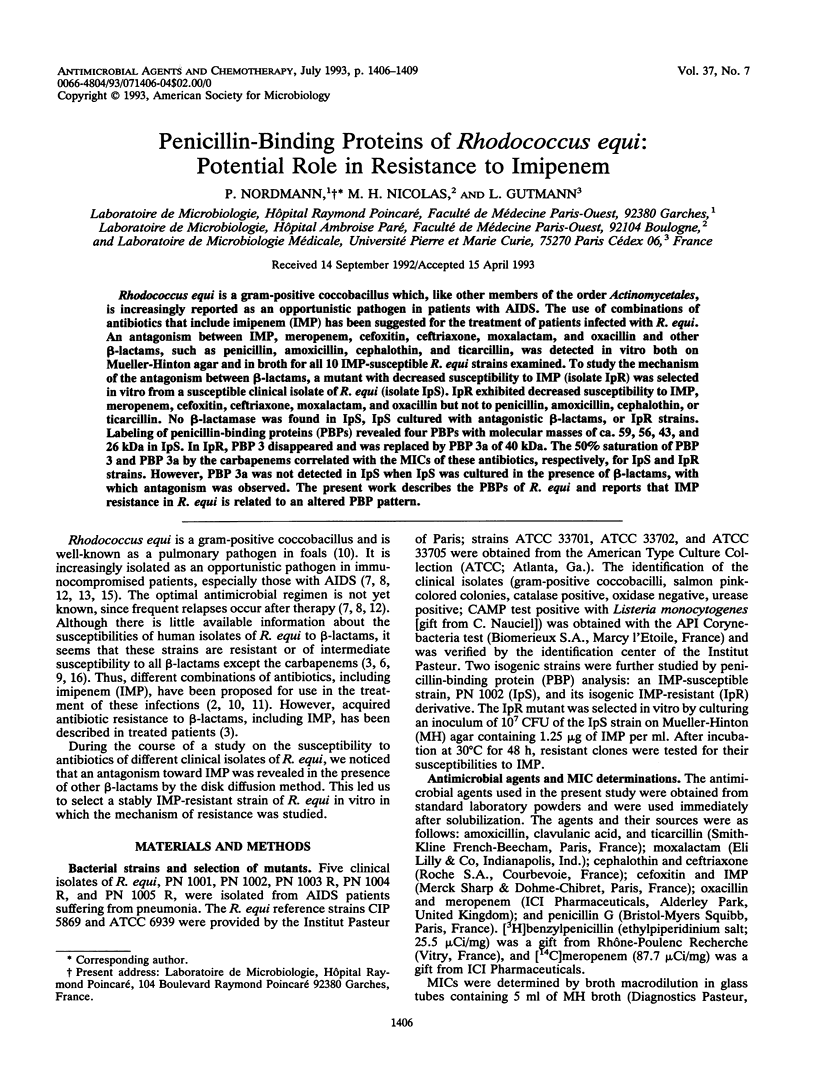
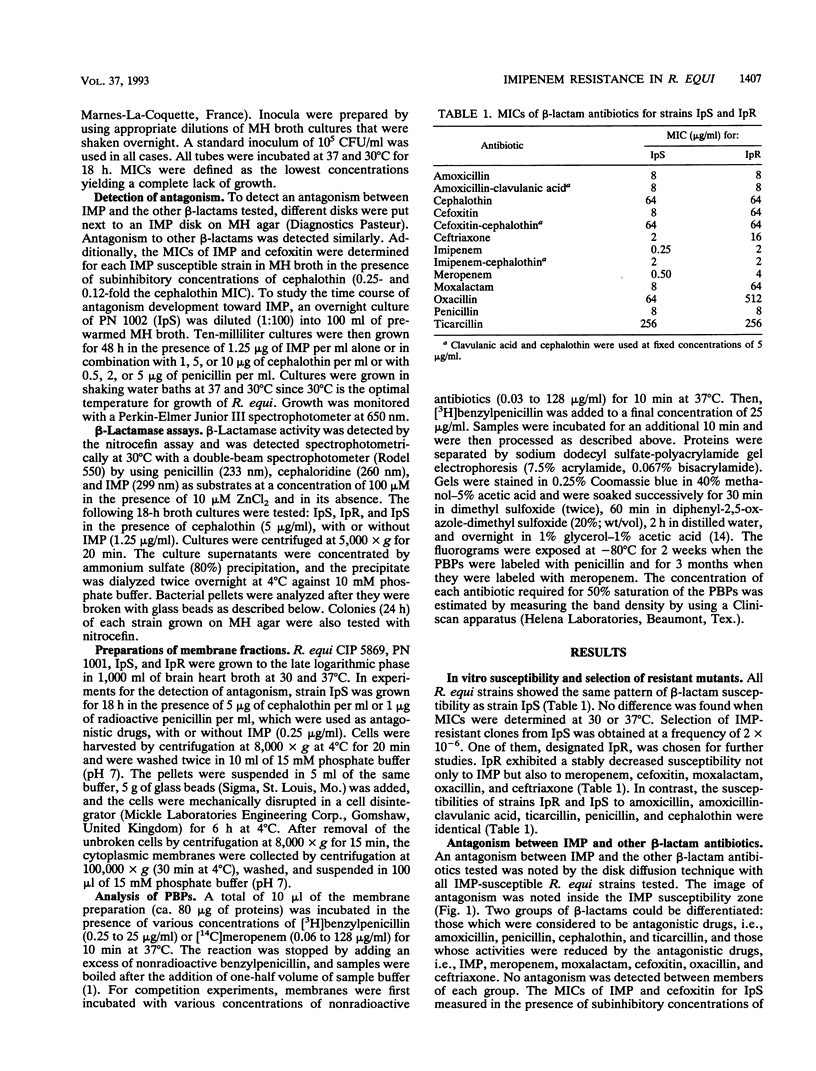
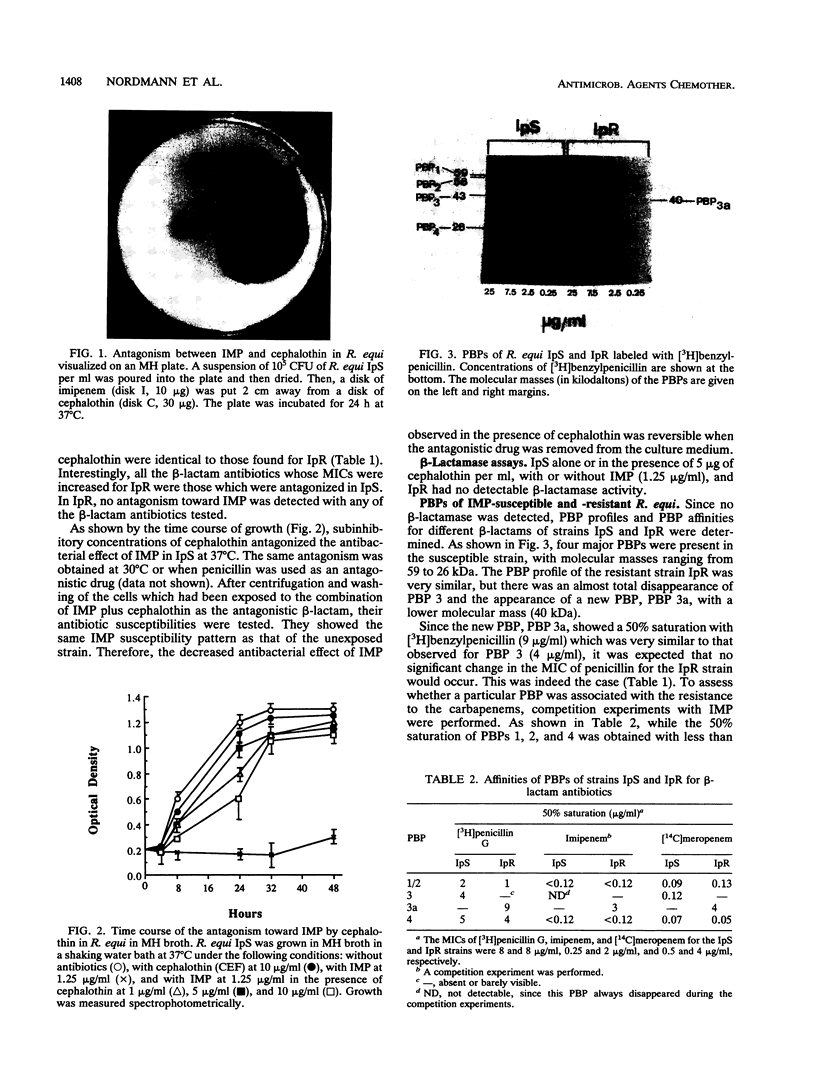
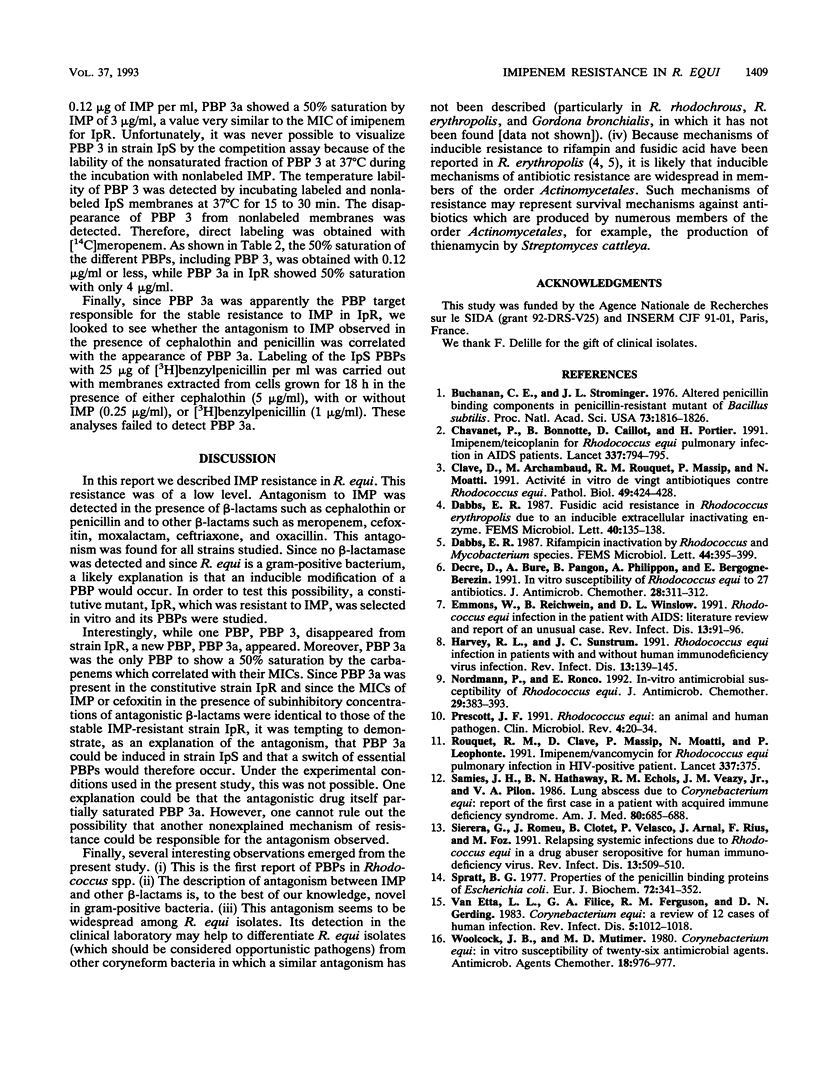
Images in this article
Selected References
These references are in PubMed. This may not be the complete list of references from this article.
- Buchanan C. E., Strominger J. L. Altered penicillin-binding components in penicillin-resistant mutants of Bacillus subtilis. Proc Natl Acad Sci U S A. 1976 Jun;73(6):1816–1820. doi: 10.1073/pnas.73.6.1816. [DOI] [PMC free article] [PubMed] [Google Scholar]
- Chavanet P., Bonnotte B., Caillot D., Portier H. Imipenem/teicoplanin for Rhodococcus equi pulmonary infection in AIDS patients. Lancet. 1991 Mar 30;337(8744):794–795. doi: 10.1016/0140-6736(91)91415-q. [DOI] [PubMed] [Google Scholar]
- Clavé D., Archambaud M., Rouquet R. M., Massip P., Moatti N. Activité in vitro de vingt antibiotiques sur Rhodococcus equi. Pathol Biol (Paris) 1991 May;39(5):424–428. [PubMed] [Google Scholar]
- Decré D., Buré A., Pangon B., Phillippon A., Bergogne-Bérézin E. In-vitro susceptibility of Rhodococcus equi to 27 antibiotics. J Antimicrob Chemother. 1991 Aug;28(2):311–313. doi: 10.1093/jac/28.2.311. [DOI] [PubMed] [Google Scholar]
- Emmons W., Reichwein B., Winslow D. L. Rhodococcus equi infection in the patient with AIDS: literature review and report of an unusual case. Rev Infect Dis. 1991 Jan-Feb;13(1):91–96. doi: 10.1093/clinids/13.1.91. [DOI] [PubMed] [Google Scholar]
- Harvey R. L., Sunstrum J. C. Rhodococcus equi infection in patients with and without human immunodeficiency virus infection. Rev Infect Dis. 1991 Jan-Feb;13(1):139–145. doi: 10.1093/clinids/13.1.139. [DOI] [PubMed] [Google Scholar]
- Nordmann P., Ronco E. In-vitro antimicrobial susceptibility of Rhodococcus equi. J Antimicrob Chemother. 1992 Apr;29(4):383–393. doi: 10.1093/jac/29.4.383. [DOI] [PubMed] [Google Scholar]
- Prescott J. F. Rhodococcus equi: an animal and human pathogen. Clin Microbiol Rev. 1991 Jan;4(1):20–34. doi: 10.1128/cmr.4.1.20. [DOI] [PMC free article] [PubMed] [Google Scholar]
- Rouquet R. M., Clave D., Massip P., Moatti N., Leophonte P. Imipenem/vancomycin for Rhodococcus equi pulmonary infection in HIV-positive patient. Lancet. 1991 Feb 9;337(8737):375–375. doi: 10.1016/0140-6736(91)91018-p. [DOI] [PubMed] [Google Scholar]
- Samies J. H., Hathaway B. N., Echols R. M., Veazey J. M., Jr, Pilon V. A. Lung abscess due to Corynebacterium equi. Report of the first case in a patient with acquired immune deficiency syndrome. Am J Med. 1986 Apr;80(4):685–688. doi: 10.1016/0002-9343(86)90825-9. [DOI] [PubMed] [Google Scholar]
- Sirera G., Romeu J., Clotet B., Velasco P., Arnal J., Rius F., Foz M. Relapsing systemic infection due to Rhodococcus equi in a drug abuser seropositive for human immunodeficiency virus. Rev Infect Dis. 1991 May-Jun;13(3):509–510. doi: 10.1093/clinids/13.3.509. [DOI] [PubMed] [Google Scholar]
- Spratt B. G. Properties of the penicillin-binding proteins of Escherichia coli K12,. Eur J Biochem. 1977 Jan;72(2):341–352. doi: 10.1111/j.1432-1033.1977.tb11258.x. [DOI] [PubMed] [Google Scholar]
- Van Etta L. L., Filice G. A., Ferguson R. M., Gerding D. N. Corynebacterium equi: a review of 12 cases of human infection. Rev Infect Dis. 1983 Nov-Dec;5(6):1012–1018. doi: 10.1093/clinids/5.6.1012. [DOI] [PubMed] [Google Scholar]
- Woolcock J. B., Mutimer M. D. Corynebacterium equi: in vitro susceptibility to twenty-six antimicrobial agents. Antimicrob Agents Chemother. 1980 Dec;18(6):976–977. doi: 10.1128/aac.18.6.976. [DOI] [PMC free article] [PubMed] [Google Scholar]




